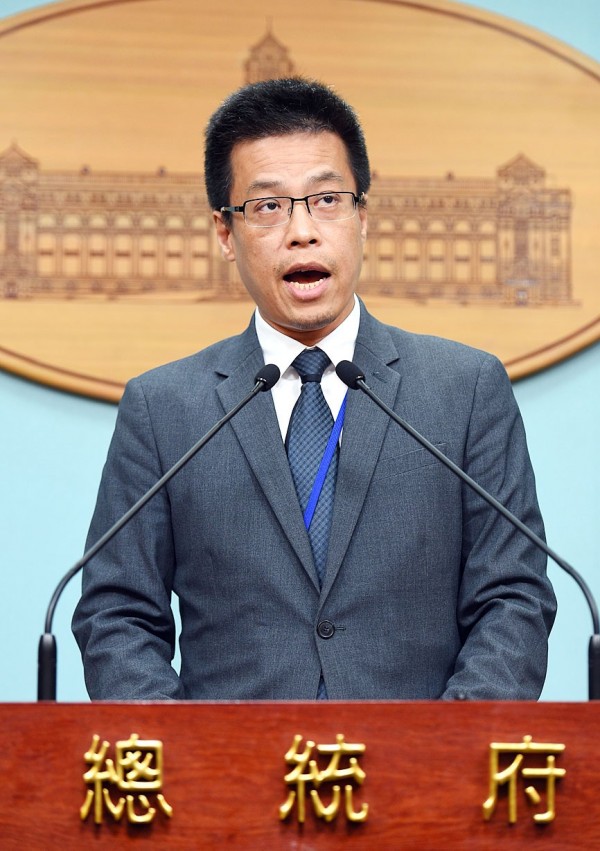《TAIPEI TIMES 焦點》 Government rejects South China Sea ruling

Presidential Office spokesman Alex Huang responds to the rulings of the South China Sea arbitration case at a news conference at the Presidential Office in Taipei yesterday. Photo: Chang Chia-ming, Taipei Times
By Stacy Hsu / Staff reporter
Taiwan yesterday refused to accept a ruling by the Permanent Court of Arbitration in The Hague, Netherlands,which included a statement that Taiwan-controlled Itu Aba Island (Taiping Island, 太平島) in the Spratly Islands (Nansha Islands, 南沙群島) is a “rock,” saying the verdict has severely infringed on Taiwan’s rights over the South China Sea island and its surrounding waters.
In the case brought by the Philippines against China over their disputes in the South China Sea, the Philippines argued that land formations claimed by Beijing in the South China Sea are not islands and therefore not entitled to 200 nautical mile (370.4km) exclusive economic zones.
While Taiwan was not party to the case, its claims in the South China Sea are similar to those of China and Itu Aba Island was brought up in testimony during the court hearings.
The international tribunal yesterday concluded that all of the high-tide features in the Spratly Islands, including Itu Aba, are legally “rocks” that do not generate an exclusive economic zone or continental shelf.
“We hereby stress that the Republic of China [ROC] enjoys rights as afforded by international law and the UN Convention on the Law of the Sea over South China Sea islands and their relevant waters,” Presidential Office spokesman Alex Huang (黃重諺) told a news conference following the issuance of the verdict yesterday afternoon.
Huang said that as Taipei was not invited to participate in the arbitration process, nor consulted on its opinion, the government solemnly declares its refusal to recognize the tribunal’s verdict and deems it as carrying no legal effect on the nation.
Reiterating the nation’s sovereignty claims over South China Sea islands and their surrounding waters, Huang said the government pledges to steadfastly safeguard the nation’s territory and sovereignty, and would prevent any infringement of its national interests.
“We call for a peaceful resolution of disputes in the South China Sea through multilateral negotiations,” he added.
Shortly after the ruling was issued, President Tsai Ing-wen (蔡英文) convened a high-level government meeting, Huang said, adding that the government has decided to move forward by one day a patrol mission to the South China Sea by a Kang Ding-class frigate originally scheduled for tomorrow.
Minister of Foreign Affairs David Lee (李大維) made an intriguing statement at a news conference at the ministry at 8pm yesterday, saying that while the international tribunal’s categorization of Itu Aba as a “rock” was the worst-case scenario for the government, Tsai would “take action” today.
Asked whether Tsai plans to board the frigate leaving for the South China Sea, Lee said: “I can say no more.”
Reacting to the ruling, Chinese Nationalist Party (KMT) Culture and Communications Committee director Chow Chi-wai (周志偉) said that it was utterly unacceptable and unsatisfactory.
Chow added that the “U-shaped line” representing the nation’s territory in the region covers a total sea area of 3.6 million square kilometers, which is more than 100 times the size of Taiwan.
“We must not relinquish our nation’s strategic interests,” Chow said, urging Tsai to clearly declare the nation’s stance and safeguard its interests.
The line — also known as the “11-dash line” — was featured in the “Location Map of the South China Sea Islands” drawn up by the ROC government in 1947. After the KMT lost the Chinese Civil War and fled to Taiwan, the Chinese Communist Party changed it to a “nine-dash line.”
Saying there is potable water and people living on Itu Aba, KMT caucus secretary-general Lin Te-fu (林德福) urged Tsai to visit the island to formally declare the nation’s sovereignty and show to the world that it is an island.
KMT Legislator Johnny Chiang (江啟臣) said Taiwan is probably “the greatest loser” in the arbitration.
“[China] has fists and countries in the South China Sea will now have an international ruling — even though the ruling is not legally binding — and the US to back their claims, but Taiwan’s island has become a rock overnight,” Chiang said.
KMT Legislator Lai Shyh-bao (賴士葆) advised the government to take “hardline measures,” such as “sending out warships immediately to the area to protect the nation’s territory.”
Former president Ma Ying-jeou (馬英九), who on January 28 visited Taiping Island in an effort to reject the Philippines’ categorization of it as a "rock" and prove to the international community that the island can sustain human habitation and economic life, posted a message on Facebook late yesterday, saying that as are all Taiwanese people, he is extremely astonished and enraged by the ruling.
The People First Party also issued a statement dismissing the ruling, saying the government must refuse to recognize any verdicts or announcements regarding South China Sea islands handed down by international courts based on “hypocritical reasons” or technicalities.
Meanwhile, the American Institute in Taiwan, reiterating its long-standing policy, said the US supports the peaceful resolution of disputes in the South China Sea, including the use of international legal mechanisms such as arbitration.
Additional reporting by Alison Hsiao
新聞來源:TAIPEI TIMES




















